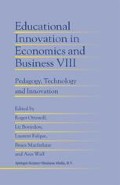Abstract
Learning has been given a variety of definitions, some of them more illuminating than others. As it is currently defined, operationally, in many educational institutions, learning is what is assumed to have taken place between teacher input and student performance on a subsequent occasion of testing. There are two problems with this version. First, the process of learning remains mysterious and unavailable to observation; and second, it is treated as a relatively passive response to curriculum delivery, while the active role in the process is attributed to the teaching, whether through teacher lectures, textbook readings or the more novel electronic means of providing input. Furthermore, the learning and teaching is “encapsulated”, to use Engeström’s (1991) term, for little consideration is given to the relationship between the knowledge to be acquired and the students’ past experience, or to the relevance of the knowledge for their current concerns and future intentions.
Access this chapter
Tax calculation will be finalised at checkout
Purchases are for personal use only
Preview
Unable to display preview. Download preview PDF.
References
Bereiter, C. (1994). Implications of postmodernism for science, or, science as progressive discourse. Educational Psychologist, 29 (1), 3–12.
Engeström, Y. (1990). Learning, working and imagining: Twelve studies in activity theory. Helsinki: Orienta-Konsultit.
Engeström, Y. (1991). Non scolae sed vitae discimus: Toward overcoming the encapsulation of school. Learning and Instruction, 1, 243–259.
Halliday, M.A.K. (1993). Towards a language-based theory of learning. Linguistics and Education, 5, 93–116.
Halliday, M.A.K., & Matthiessen, C.M. (1999). Construing experience through meaning: A language-based approach to cognition. London: Cassell.
Lave, J., & Wenger, E. (1991). Situated learning: Legitimate peripheral participation. New York: Cambridge University Press.
Lemke, J.L. (2002). Becoming the village: Education across lives. In G. Wells & G. Claxton (Eds.), Learning for life in the C21 st: Sociocultural perspectives on the future of education (pp. 34–45 ). Oxford: Blackwell.
Leont’ev, A.N. (1981). The problem of activity in psychology. In J.V.Wertsch (Ed.), The concept of activity in Soviet Psychology (pp. 37–71 ). Armonk, NY: Sharpe.
Resnick, L. (1987). Learning in school and out. Educational Researcher, 16(9), 13–20. Rogoff, B. (1990). Apprenticeship in thinking: Cognitive development in social context. New York: Oxford University Press.
Scardamalia, M., Bereiter, C., & Lamon, M. (1994). The CSILE project: Trying to bring the classroom into World 3. In K. McGilley (Ed.), Classroom lessons: Integrating cognitive theory and classroom practice (pp. 201–228 ). Cambridge, MA: MIT Press.
Turoff, M. (1999). An end to student segregation: No more separation between distance learning and regular courses. Invited plenary for the Telelearning 99 meeting, Montreal, Canada [On-line]. (Accessed 14/07/02). URL:http://eies.njit.edu/~turoff/Papers/canadapresent/segregation.htm
Vygotsky, L.S. (1978). Mind in society: The development of higher psychological processes. Cambridge, MA: Harvard University Press.
Vygotsky, L.S. (1981). The genesis of higher mental functions. In J.V. Wertsch (Ed.), The concept of activity in Soviet Psychology (pp. 144–188 ). Armonk, NY: Sharpe.
Vygotsky, L.S. (1987). Thinking and speech. In R.W. Rieber & A.S. Carton (Eds.), The collected works of L.S. Vygotsky, Volume 1: Problems of general psychology (pp. 39–285 ). New York: Plenum.
Wells, G. (1999). Dialogic inquiry: Towards a sociocultural practice and theory of education. Cambridge: Cambridge University Press.
Wertsch, J.V. (1998). Mind as action. Oxford: Oxford University Press.
Author information
Authors and Affiliations
Editor information
Editors and Affiliations
Rights and permissions
Copyright information
© 2004 Springer Science+Business Media Dordrecht
About this chapter
Cite this chapter
Wells, G. (2004). Creating and Improving a “Virtual Object” Through Web-Mediated Discourse. In: Ottewill, R., Borredon, L., Falque, L., Macfarlane, B., Wall, A. (eds) Educational Innovation in Economics and Business. Educational Innovation in Economics and Business, vol 8. Springer, Dordrecht. https://doi.org/10.1007/978-94-017-1386-3_17
Download citation
DOI: https://doi.org/10.1007/978-94-017-1386-3_17
Publisher Name: Springer, Dordrecht
Print ISBN: 978-90-481-6505-6
Online ISBN: 978-94-017-1386-3
eBook Packages: Springer Book Archive

